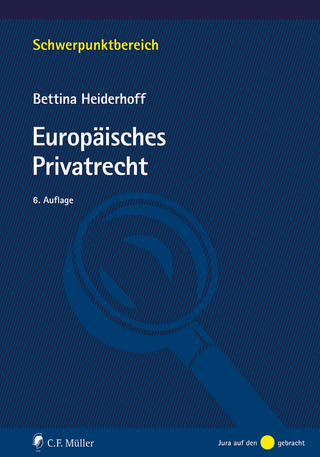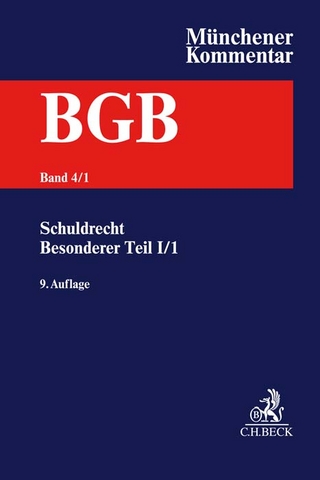
Good Faith in Transnational Law
Martinus Nijhoff (Verlag)
978-90-04-52237-4 (ISBN)
Transnational law currently appears fragmented and captured by self-interested corporate actors. Good faith is at the heart of this fragmentation. To defend transnational law thus requires an account of good faith. Good Faith in Transnational Law explains and recasts fragmentation and capture as something valuable, and casts good faith as an obligation of other-regarding communicative conduct. Frédéric Gilles Sourgens argues that the fragmentation we experience is a virtue: for communication across vastly different commercial, economic, social, cultural and linguistic contexts to remain legally meaningful, we must translate our different expectations into a shared, context-bound idiom. He argues that law harnesses stress of such translations through stress fields that reintegrate the different experiences in a shared transnational discourse.
Frédéric Gilles Sourgens, Ph.D. (Law), Johann Wolfgang Goethe Universität, Frankfurt a.M., is the Senator Robert J. Dole Distinguished Professor of Law at Washburn University School of Law. He has published extensively on transnational law, international energy law, international environmental law and legal theory, including A Nascent Common Law (Brill, 2015).
Preface
1 Introduction
2 What Is “Transnational Law”?
1 The Classic Conflict of Laws Approach
2 A Clash of Principles
2.1 Globalization’s Liberal Aspirations
2.2 The Internalization of Globalization in State Law
2.3 Good Faith and the Clash of Principles
3 The Descriptive Blind Spot
4 Two-Faced Faith?
5 Conclusion
3 Good Faith as Pluralist Principle
1 The Point of Transnational Law
2 The Pluralist Starting Point
3 Good Faith and Legal Pluralism
3.1 Why Good Faith
3.2 Acknowledging Functional Differences
3.3 Good Faith as Obligation of Conduct
3.4 Good Faith as Communication
3.5 Good Faith as Other Regard
3.6 Good Faith as Unity of Difference
4 Pluralist Good Faith in the Lex Mercatoria
1 The Test Case of the New Lex Mercatoria
2 Good Faith in the New Lex Mercatoria
2.1 Good Faith and Other Regard
2.1.1 Other Regard in the General of Principle of Good Faith and Fair Dealing
2.1.2 Other Regard and Abuse of Rights
2.1.3 Other Regard and Clean Hands
2.1.4 Other Regard and Implied Obligations
2.1.5 Conclusion
2.2 Good Faith and Communication
2.2.1 Forfeiture and the Duty to Communicate
2.2.2 Communication and Inconsistent Behavior
2.2.3 Duty to Renegotiate
2.2.4 Pre-contractual Liability?
2.2.5 Conclusion
3 The Yardstick of Good Faith
3.1 The Authoritative Language of Good Faith
3.2 Good Faith and Economic Utility
3.3 Good Faith and Quasi-Moral Duty
4 Chaos in a Faithless World
5 Good Faith as Driver of Self-Regulation
6 A First Order Conception of Pluralist Good Faith in Transnational Law
7 Conclusion
5 Reflexive Good Faith
1 A Model for Polycentric Norm Generation in Transnational Law
2 Good Faith and Social Dimension of Polycentric Transnational Norm Generation
3 Good Faith and the Substantive Dimension of Polycentric Transnational Norm Generation
4 Good Faith and the Temporal Dimension of Polycentric Transnational Norm Generation
5 Good Faith and Legal Life Cycles
6 A Second Order Conception of Pluralism
7 Conclusion
6 Good Faith as Stress Fields
1 Re-entry and Stress Fields
1.1 Three Good Faiths
1.1.1 Pragmatic Good Faith
1.1.2 Utilitarian Good Faith
1.1.3 Constructivist Deontological Good Faith
1.2 Stress Fields
2 The Constitutional Moment as a Stress Field
2.1 Stress Testing Operational Closure
2.2 Stress Testing Structural Couplings
2.3 Stress Testing the Other Side of Structural Couplings
3 Conclusion: Meeting the Moment
7 Conclusion
Bibliography
Index
| Erscheinungsdatum | 09.09.2022 |
|---|---|
| Reihe/Serie | International and Comparative Business Law and Public Policy ; 3 |
| Sprache | englisch |
| Maße | 155 x 235 mm |
| Gewicht | 332 g |
| Themenwelt | Recht / Steuern ► EU / Internationales Recht |
| Recht / Steuern ► Privatrecht / Bürgerliches Recht ► Internationales Privatrecht | |
| ISBN-10 | 90-04-52237-9 / 9004522379 |
| ISBN-13 | 978-90-04-52237-4 / 9789004522374 |
| Zustand | Neuware |
| Haben Sie eine Frage zum Produkt? |
aus dem Bereich


